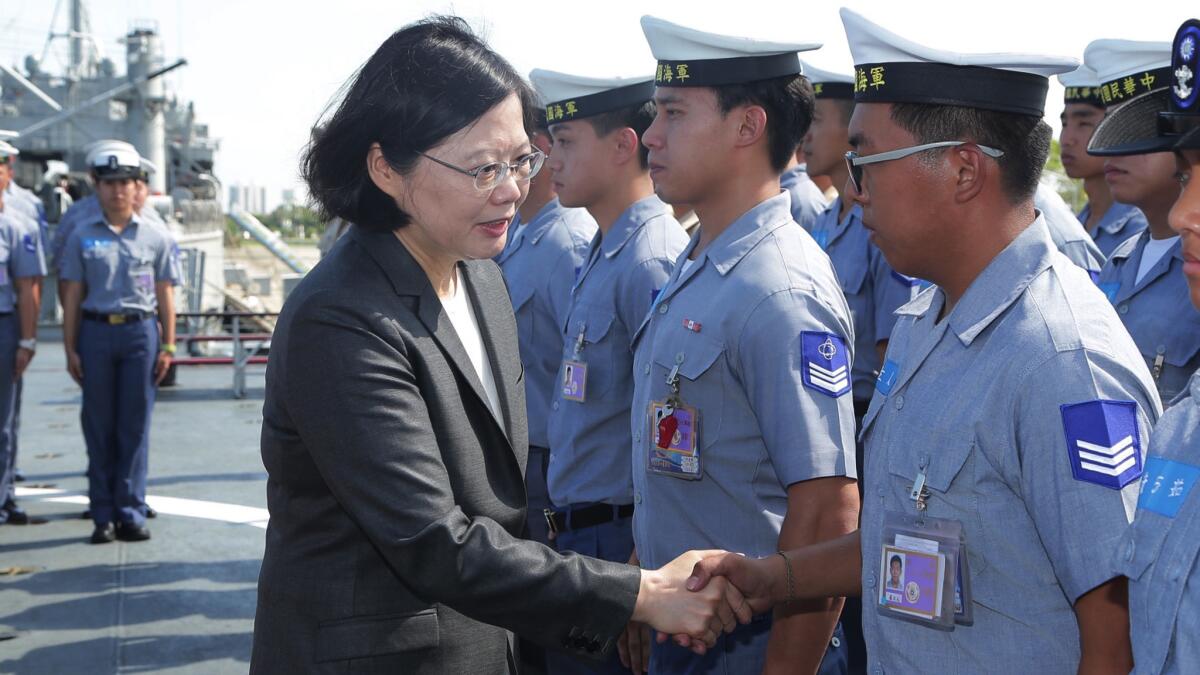After tribunal rules against China, some Filipinos call for ‘Chexit.’ But Southeast Asian leaders aren’t gloating

Reporting from Beijing — A day after an international tribunal in The Netherlands issued a sweeping ruling against China over its conduct and claims in the South China Sea, ordinary Filipinos continued to exult Wednesday over the result. But government officials in Manila – and across Southeast Asia – maintained a largely circumspect posture as they considered their next moves.
Filipinos flooded social media with self-congratulatory messages and held parties to show excitement about the decision from the Permanent Court of Arbitration in The Hague. Some Filipinos posted messages online calling for “Chexit” – i.e., China’s exit from the South China Sea.
Chinese officials, however, maintained their stance that they would ignore the tribunal’s ruling. China issued a lengthy White Paper titled “China Adheres to the Position of Settling Through Negotiation the Relevant Disputes Between China and the Philippines in the South China Sea.”
China also said that, if threatened, it may impose a so-called air defense identification zone in the region. That would require airplanes flying over the South China Sea to first notify Beijing. Such a step, if taken, would likely increase tensions with both Washington and Manila.
At the same time, though, China’s foreign minister suggested that Beijing and other countries could engage in joint exploitation of fisheries as well as oil and gas deposits in the region.
“China has reacted rather harshly in words, but what its real reaction, what measures it will take, remains to be seen,” said Linda Jakobson, a visiting professor at the U.S. Studies Center at the University of Sydney in Australia and author of “The Perception Gap: Reading China’s Maritime Objectives In Indo-Pacific Asia.”
“Behind the scenes, there is a lot of diplomacy going on,” she added.
Many Filipinos on Wednesday expressed gratitude toward former President Benigno Aquino, who initiated the case in 2013, claiming that China had committed multiple violations of the U.N. Convention of the Law of the Sea (UNCLOS)and asking for clarifications about what maritime rights the various land formations in the region were entitled to – no matter who controlled them.
Current Philippine President Rodrigo Duterte, who took office in June and has adopted a less confrontational stance toward Beijing than his predecessor, has said he is open to direct negotiations with China. Duterte kept a low profile on Wednesday. The Inquirer, a Philippine newspaper, reported that the government would take five days to study the ruling before commenting.
See the most-read stories in World News this hour >>
China, the Philippines, Vietnam, Malaysia, Brunei and Taiwan have long had competing claims to territory – and maritime rights – in the resource-rich and strategically important South China Sea. The Hague tribunal did not rule on questions of sovereignty, but found that China’s claim of “historical rights” in the area was invalid. It said China had violated UNCLOS by damaging the environment with its island-building projects and by allowing destructive techniques to harvest endangered giant clams.
The court also said that none of the land formations in the Spratly Islands were large enough to have “exclusive economic zones” extending 200 nautical miles from their shores.
That decision in particular disappointed Taiwan, which controls the largest landmass in the Spratlys – known variously as Itu Aba, or Taiping. Although Taiwan is often at odds with China, it had aligned itself with China’s stance on South China Sea matters.
On Wednesday, Taiwanese President Tsai Ing-wen briefly went aboard the Dihua frigate, a navy warship, before the vessel headed to the Spratlys for a routine patrol mission. (Tsai got off the ship before it departed). Adopting a more muscular stance, the coast guard also switched out a 100-ton Spratly Islands patrol ship with a 2,000-ton ship a few days ago.

Taiping has an airstrip, some solar panels and coast guard base, and Taiwan regards it as an island. But the tribunal deemed it a rock, meaning whoever occupies it cannot claim an exclusive economic zone in surrounding waters
Taiwan, echoing China, said it did not consider the ruling legally binding. Still, it said in a statement that it “urges that disputes in the South China Sea be settled peacefully through multilateral negotiations, in the spirit of setting aside differences and promoting joint development.”
Taiwan, it added, “is willing, through negotiations conducted on the basis of equality, to work with all states concerned to advance peace and stability in the South China Sea.”
Malaysia likewise was urging dialogue, according to the Star online, an English-language news site in the capital, Kuala Lumpur. The government wants China and other countries involved in the dispute to find “constructive ways” to talk and negotiate, the Star reported Wednesday.
Ibrahim Suffain, co-founder of the Merdeka Center for Opinion Research in Kuala Lumpur, said ordinary Malaysians have little awareness of the South China Sea issues, but they respect the U.N. arbitration process because Malaysia has used it before against Singapore and Indonesia. The government is in a difficult position over how to react to the verdict, he said.
“They’re in a quandary because China is one of the biggest investors in the country and has close relations with the country’s leaders, so they don’t want to offend China,” Suffain said.
Vietnam’s Foreign Ministry welcomed the court ruling Tuesday and noted that it had sent a statement of its support to the tribunal, the state-run Viet Nam News said. Relations between Vietnam and China have been strained over South China Sea issues; in 2014, China authorized a state-owned oil company to station a rig near the Paracel Islands in an area also claimed by Vietnam, sparking deadly anti-China riots in Vietnam.
Vietnam will develop a comprehensive response to the ruling, but for now advocates “peaceful resolution,” Foreign Ministry spokesman Lê Hải Bình said.
Indonesia urged all parties to exercise restraint, avoid raising tension and maintain peace in the region, the Straits Times of Singapore said, quoting the Indonesian Foreign Ministry.
Indonesia is not a major South Sea claimant, but it has clashed with China over the 272 Natuna Islands near Borneo. Indonesia has found Chinese fishing boats there and in March, Chinese vessels stopped Indonesia from making arrests.
A Jakarta Post commentary piece on Tuesday said “Indonesia has a moral high ground it can project without rubbing salt in Beijing’s wounds: a principled stand based on international law and not a rejection of China.”
Alex Chiang, international relations professor at National Chengchi University in Taipei, said he saw the opportunity for both bilateral and multilateral negotiations.
China will prefer bilateral negotiations, he said, because it has individual disputes with specific countries and because it could flex its economic and military strength in any two-way talks. “In bilateral negotiations, the strongest state always wins,” he said.
Jerome A. Cohen, an expert in Chinese law at New York University, said he expected China’s “threatening gestures to persist for a while but there will also be quiet attempts to make a face-saving deal” with the Philippines through economic incentives “and even under-the-table influences.”
“This may stimulate serious negotiations with other neighbors too,” he wrote on his blog. “I think Vietnam and Indonesia can credibly threaten to launch their own arbitrations unless Beijing gives assurances of better behavior and shows a genuine willingness to compromise.”
Staff writer Makinen reported from Beijing and special correspondent Jennings from Taipei.
MORE WORLD NEWS
When does a rock become an island? It’s a key to the South China Sea case
Residents of impoverished Gaza Strip turn to Turkey for lifesaving medical care
More to Read
Sign up for Essential California
The most important California stories and recommendations in your inbox every morning.
You may occasionally receive promotional content from the Los Angeles Times.











